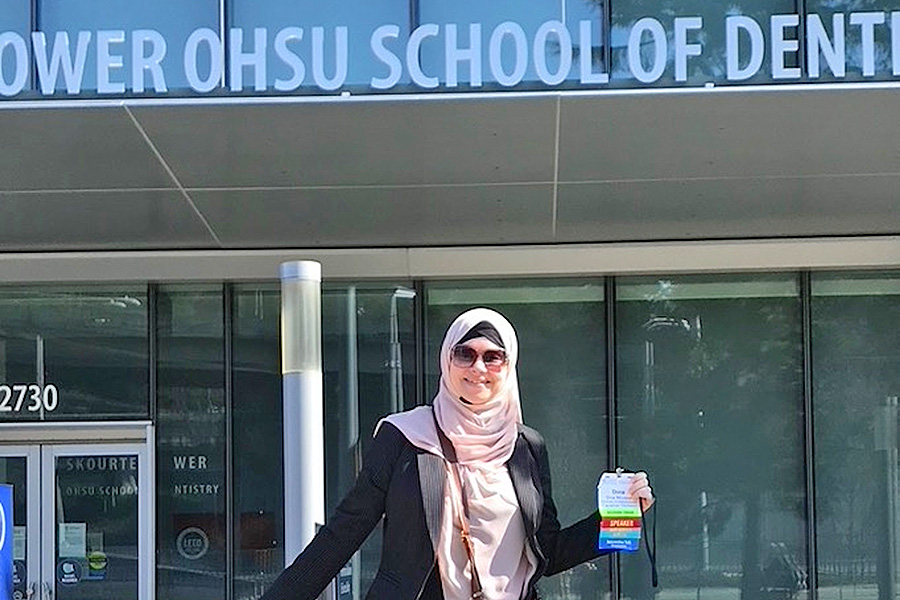
Research into tooth decay biomarkers could shape diagnostic, treatment approaches
Research by postdoctoral fellow Dr. Dina Moussa in identifying biomarkers of dental caries (tooth decay) was recognized with the Ned Lally Award.
A College of Dentistry postdoctoral fellow has been recognized for her research about identifying biomarkers of dental caries (tooth decay) to aid in furthering diagnostics and therapeutics.
Dr. Dina Moussa (DDS, PhD) received the Ned Lally Award for her work Dental caries onset: integrative multi-omics signatures during the Symposium for Young Investigators in Microbiology and Immunology research group held during the recent American Association for Dental, Oral, and Craniofacial Research (AADOCR) and Canadian Association for Dental Research (CADR) meeting in Portland, OR.
“This award means a lot to me for two reasons: first, I was the only international and Canadian competitor within a diverse group of distinguished American scientists; second, it was a great opportunity to feature our institution, USask, and share the rigorous collaborative and inter-disciplinary research we conduct, which I believe will open several avenues of collaboration in the near future,” said Dr. Moussa, a fellow from the University of Saskatchewan lab of Dr. Walter Siqueira.
The symposium promotes information exchange among early, mid-career, and senior scientists who engage in oral microbiology and immunology research and clinical studies on oral health and disease.
Dr. Moussa presented work assessing the output of omics studies in dental caries research for both the microbiome- and host-related flow of information along the central dogma of biology from the genomic data to the end products of metabolism that could underlie dental caries. Omics refers to fields of study that probe and analyze data representing the structure and function of an entire makeup of a given biological system, which has substantially revolutionized methodologies in interrogating biological systems.
This work was done with experts in next generation sequencing and salivary proteomics from the University of California in Davis and University of Saskatchewan, respectively, to identify trends and gaps and to shed light on critically needed study designs that could unravel the complexities of this disease.
“I believe that working in silos would not aid in delineating the linkages, correlations, and inter-relationships necessary for a deeper understanding of the behavior of microbiota and host responses.” Dr. Moussa said. “Further integrative-omic studies is the avenue to take to deeply understand the host-microbe interactions and crosstalk, particularly in areas of metabolomics and host genetics of caries susceptibility to move us closer to the promise of personalized dentistry.”
Based on remarks that Dr. Moussa and her co-authors concluded as part of a critical review, she introduced her novel longitudinal and inter-disciplinary model for the seldomly studied functional biomarkers of the onset of dental caries. This work is in collaboration with researchers mostly from the University of Minnesota was done by integrative analysis of the microbiome changes and metabolic profiles at the onset of the dental caries, the very early signs which is undetected clinically.
“The signatures we report for the onset of caries can be key to prevent/arrest the disease at its early stage before it progresses to overt lesions, so that invasive restorative treatments as well as massive expenses in healthcare budgets can be prevented,” said Dr. Moussa, whose research activities are supported by a Canadian Institutes of Health Research grant from Siqueira.
Currently, Dr. Moussa is working on implementing this approach on a large-scale clinical study on patients at the College of Dentistry to define distinctive biomarkers of dental caries at its different stages aiming for customizing preventive approaches.

